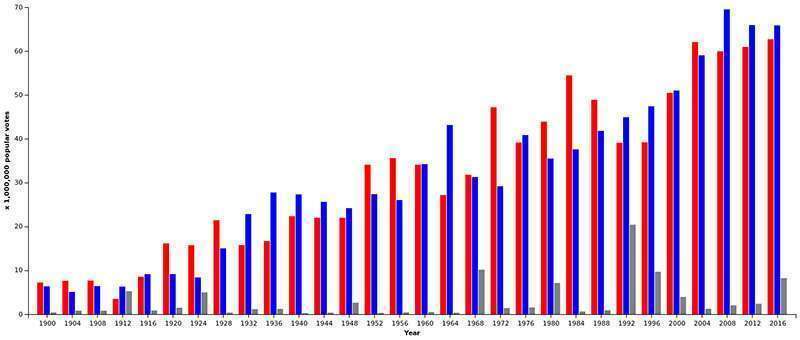Justin Amash and the unknown of the third candidate in the United States

On April 28, Congressman Justin Amash announced his intention to form a committee to explore the possibility of being the Libertarian Party's candidate in the U.S. presidential election to be held this November. In doing so, he will face the candidates of the two hegemonic parties in the United States, Donald Trump, a Republican, and Joe Biden, a Democrat.
Justin Amash, 40, a congressman from Michigan since 2011, was a member of the Republican Party until last year. In July 2019, Amash decided to leave the party, disappointed by the decision of his Republican colleagues to defend Trump during the investigation into the president's alleged abuse of power in his relations with the Ukrainian government. The investigation preceded the impeachment of the president, who was eventually acquitted by the Republican majority in the Senate.
Amash was the only Republican congressman to support the impeachment, breaking lines with the party he had represented since 2011 and accusing the president of "violating the public trust". Of course, his decision to place his conscience above party discipline infuriated Trump, who after learning that Amash would leave the Republican Party tweeted: "Great news for the Republican Party, as one of the most stupid and disloyal men in Congress is going to 'leave' the party.
Amash had already demonstrated his distance from Trump in 2016, when he was one of the prominent Republicans who vocally opposed the New York tycoon's presidential campaign, thus becoming a rare voice in the current context of partisan polarisation in the United States.
However, despite his opposition to Trump, Amash is also far removed from many of the Democratic Party's theses. Amash is, after all, a libertarian, and as such calls for policies that reduce the role of the state in the lives of citizens as much as possible: in fact, he was elected to Congress in 2010 in the context of a large conservative reaction (the Tea Party) against the Obama presidency and the expansion of the state in areas such as public health or foreign policy.
Therefore, Amash's candidacy should be read as one more step in his crusade against the expansion of the state, since he defends the classic positions of the Republicans of yesteryear: fiscal discipline, a small state and the defence of individual liberties. In a recent interview with Politico, Amash stated that the Republican Party "is no longer the place for people who believe in classical liberalism [...] I think today it is a place for nationalism and protectionism. Basically, it's a place for Trump."
It is virtually impossible for Amash to win the presidential election, or even to win it in one state. The U.S. political system is configured in such a way that it is almost impossible for a third party to stand out from the Democrats and Republicans. And yet, his candidacy could be key to tipping the balance in favour of one of the candidates.
Over the past century, Democrats and Republicans have consistently split the vast majority of votes in presidential elections. As the following graph shows, the candidates of small parties (in gray) have not managed to carve out a niche for themselves between the two hegemonic parties (in red the Republicans and in blue the Democrats). However, small party candidacies have sometimes been very significant, taking away a substantial number of votes from one of the two big parties.

The most notorious case is the candidacy of Ralph Nader in 2000. Republican George W. Bush won the election that year with a tiny lead over his rival Al Gore. Bush secured his victory in an agonising recount in Florida, where he won by only 537 votes. In Florida, the third most voted candidate was Ralph Nader of the Green Party, with about 97,000 votes. Several political scientists and polls that year claim that the Green Party electorate was closer to Gore than to Bush, so it is not unreasonable to think that the Green Party snatched thousands of votes from the Democrat that would have brought Gore to the White House instead of Bush.
That is why Justin Amash's candidacy has filled the impending race for the White House with questions. After all, much of Amash's support comes from right-wing voters who, like him, are disenchanted with the current Republican Party, and in particular Donald Trump. As such, his candidacy could be an obstacle for Trump, especially in the handful of states where a fierce battle between the current president and Joe Biden is expected, such as Florida, Pennsylvania and Ohio. In those states, the winner in November is likely to be a few thousand votes, so the handful of voters who choose Amash is expected to be crucial in tipping the balance.
However, Amash could also pose a threat to Biden, as it could drag down thousands of voters eager to see a change in Washington policy. Certainly Biden, vice president from 2008 to 2016 and on the political front lines since the 1970s, does not represent such a change.
Justin Amash's Libertarian candidacy is ultimately a question mark. Amash represents millions of citizens who are unhappy with the two-party American system. It is a sector of the electorate that, even though they know it is almost impossible for the congressman to reach the White House, they do not resign themselves to voting for the least bad option between Democrats and Republicans. Time will tell if that sector of the electorate that decides for Amash will end up being decisive in giving the presidency to Donald Trump or Joe Biden.

